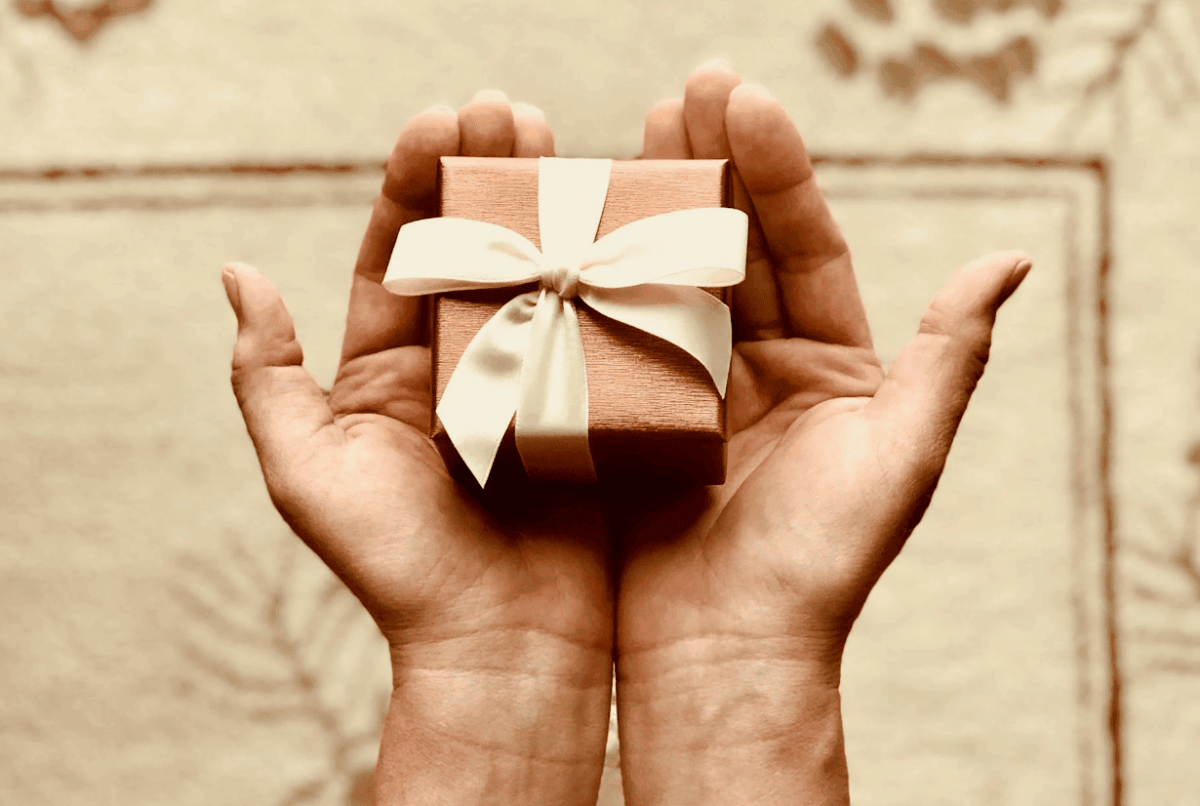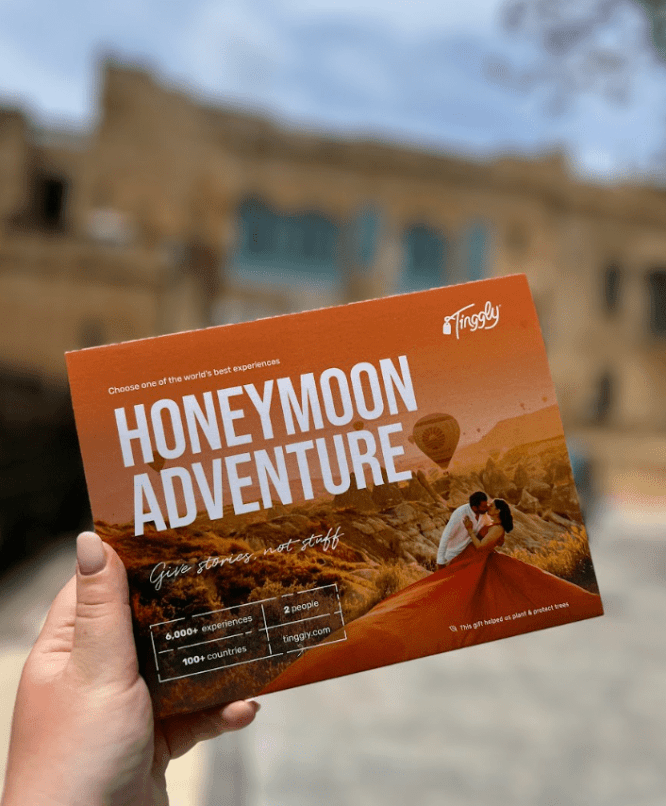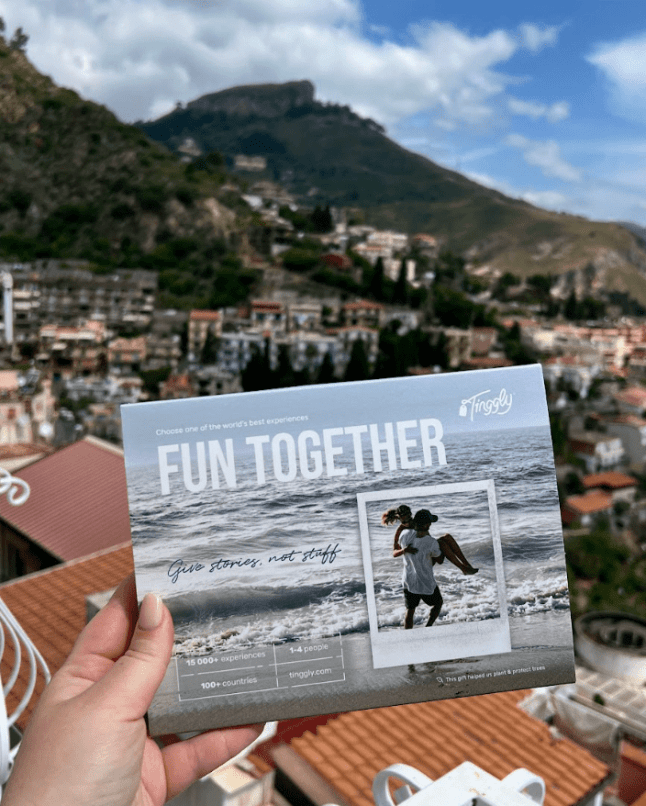Gift-giving in Samoa is far more than a gesture. More so, it’s a powerful expression of love, respect, and community.
Deeply rooted in fa‘a Samoa (the Samoan way), these traditions are carried through generations and play a central role in family, village, and ceremonial life. from honoring loved ones during weddings to marking milestones like birthdays.
Samoan gifts reflect cultural values that prioritize togetherness, gratitude, and reverence for elders.
In this guide, you’ll discover the meaning behind traditional Samoan gifts, how they’re used in major life events, and how you can thoughtfully participate in or honor these traditions — whether you’re part of the culture or simply inspired by it.
From time-honored customs to modern adaptations, here are the stories and symbols that make Samoan gift-giving so unforgettable.

Looking for something meaningful? Check out Tinggly’s curated birthday gifts to help you celebrate with heart.
Samoan Gift Giving: A Cultural Overview
Gift-giving is a cornerstone of Samoan life, woven into the fabric of celebrations, responsibilities, and rituals. In Samoa, a gift is never just a gift — it’s a symbol of fa‘aaloalo (respect), alofa (love), and tautua (service to others). Whether it’s a handcrafted mat passed between families or a basket of food brought to a birthday, each item carries deep cultural meaning.
At the heart of Samoan gifting is the belief that personal possessions can be used to uplift others. Gifts are not about material value but about expressing generosity and strengthening social bonds. They are given during fa‘alavelave (important family or village occasions), where entire communities come together to support a shared cause — a wedding, a funeral, or the opening of a new home.
From traditional woven goods to food and financial support, Samoan gifts serve as a living testament to the values of unity, reciprocity, and care. And while customs evolve, these core principles remain beautifully intact.
The Meaning of Samoan Gifts
In Samoan culture, a gift is never an afterthought. It’s more of a statement of intent, identity, and belonging. Every item given, whether large or small, carries a message of connection and respect. This is especially true during major life events like weddings, birthdays, and funerals, where gifting becomes a shared expression of alofa (love) and fa‘aaloalo (respect).
Gifts often represent a family’s honor and generosity. A finely woven mat, for example, isn’t just beautiful — it holds spiritual and ancestral significance. When passed from one family to another, it becomes a bridge between histories, acknowledging the giver’s heritage and the receiver’s importance.
Even practical gifts like food, money, or handmade crafts are steeped in purpose. They’re meant to relieve burdens, strengthen ties, or express gratitude. Importantly, the act of giving is communal. It’s not about individual wealth, but about collective contribution, a shared responsibility that binds people together in celebration or sorrow.
Samoan gifts are more than physical objects. They are expressions of care, rooted in centuries of tradition, and offered with the kind of sincerity that transcends words.
Traditional Samoan Wedding Gifts
In Samoa, weddings are grand communal events steeped in tradition, where gift-giving plays a central role. These gifts aren’t just for the couple — they’re meant to honor the extended families involved and affirm connections across generations.
One of the most treasured traditional gifts in a Samoan wedding is the ‘ie toga — a fine woven mat made from dried pandanus leaves. These mats carry immense cultural value and are often passed down as heirlooms. They’re presented by the bride’s family to the groom’s side as a sign of respect and goodwill. The finer the mat, the greater the honor it bestows.
Other significant wedding gifts include tapa cloths (siapo), traditional Samoan jewelry, and meaalofa (monetary contributions), all given during a fa‘alavelave — a formal family event that surrounds the wedding celebration. It’s not unusual for entire villages to contribute, emphasizing unity, support, and shared responsibility.
Today, modern couples may also incorporate unique gifts or meaningful experiences alongside tradition. If you’re looking to celebrate a union in a thoughtful way, consider one of Tinggly’s wedding experiences — curated for couples who value connection and memory-making.

Samoan Birthday Traditions & Celebrations
In Samoa, birthdays are often joyful, community-oriented celebrations rooted in gratitude and connection. While every birthday is appreciated, certain milestone years — like the 1st, 21st, 50th, and 70th — hold special weight and are often celebrated with greater formality and flair.
It’s not uncommon for a child’s 1st birthday to involve extended family, church groups, and neighbors gathering for a feast and prayers of thanks. At 21, young adults often host large parties to mark their coming of age, including music, dancing, and heartfelt speeches. The 50th and 70th are seen as moments of reflection and family pride, sometimes rivaling weddings in size and effort.
Gifts typically reflect the closeness of the relationship. Common birthday offerings include money (meaalofa), food platters, clothing, or household goods. However, what matters more than the item is the intention — the act of showing up, giving thanks, and sharing joy.
Today, many Samoan families blend tradition with new ideas, such as gifting curated travel or adventure-based experiences. Looking for a meaningful way to celebrate someone’s special day? Explore thoughtful birthday gifts from Tinggly — a great way to turn moments into lifelong memories.
Types of Samoan Gifts & Ideas for Every Occasion
In Samoan culture, gift-giving isn’t limited to birthdays and weddings. It flows through nearly every life event — from funerals and reconciliations to christenings, house blessings, and even farewells. The types of gifts given often reflect the tone of the occasion, the closeness of the relationship, and the cultural traditions being honored.
While handmade mats and ceremonial goods still hold deep significance, many Samoans today embrace both traditional and modern ideas — blending ancestral customs with personal creativity. Whether you’re gifting to mark a milestone or simply to show appreciation, these ideas offer meaningful options rooted in Samoan values.
Looking for thoughtful inspiration that fits any budget? Tinggly offers a wide selection of gifts under $50 dollars, perfect for adding a personal touch to any celebration.
Mats and Woven Goods
Perhaps the most iconic of all Samoan gifts, ‘ie toga (fine mats) are treasured for their cultural symbolism. These intricately woven pieces are made by hand, often over many months, and represent respect, dignity, and heritage. They’re presented during weddings, funerals, apologies, and other formal gatherings to elevate the significance of the moment.
Money and Food
Giving meaalofa (cash gifts) is a practical yet symbolic gesture that supports families during events like fa‘alavelave. It’s not unusual for guests to bring envelopes or transfer funds in advance. Food also plays a huge role — large trays of dishes, roasted pigs, and baskets of tropical fruits are commonly exchanged at events to feed and honor guests.
Key Etiquette in Samoan Gift Giving
Understanding how to give a gift is just as important as the gift itself in Samoan culture. Etiquette is deeply rooted in values like humility, gratitude, and honor — and following traditional customs shows respect for the person or occasion being celebrated.
Here are some of the most important things to know:
- Never refuse a gift. In Samoan culture, declining a gift is seen as disrespectful, even if the gesture feels modest or unexpected. Always accept with a smile and a thank you.
- Presentation matters. Gifts are usually presented with both hands and sometimes wrapped in special cloth or laid on ceremonial mats. During fa‘alavelave, gifts may be handed over formally in front of elders or community members.
- Timing is thoughtful. For important occasions, such as funerals or weddings, gifts should be given early or during a formal exchange. It shows intention and preparedness.
- Give as a family or group. In Samoa, gifting is often communal. Extended families will pool resources to give one significant gift, reflecting collective care and shared responsibility.
Following these customs isn’t just polite — it’s a meaningful way to participate in the spirit of fa‘a Samoa. Whether you’re gifting something traditional or something more modern, like a curated Tinggly experience, honoring the process shows true respect.
Other Significant Samoan Celebrations and Gift Giving
Beyond weddings and birthdays, Samoan culture is rich with meaningful occasions where gifts are essential. These events are often deeply spiritual, emotional, or ceremonial, with gifts acting as a bridge between tradition and community care.
Each moment calls for a different kind of giving — from symbolic gestures to substantial offerings — but all are delivered with one intention: to uplift, honor, and heal.
Looking for a meaningful yet modest gesture? You can find thoughtful gifts under $100 that still feel deeply personal and respectful.
Funerals and Apologies
In times of loss or reconciliation, gifts express empathy and responsibility. During funerals, families often present ‘ie toga (fine mats), tapa cloths, and large trays of food to the bereaved. These offerings aren’t just symbolic — they help support the grieving family and reflect shared sorrow.
In formal apologies (ifoga), mats are also central. The person or group asking forgiveness may cover themselves with mats in a posture of humility, offering them as part of the peace-making ritual. It’s a powerful act of cultural accountability.
Modern Adaptations of Samoan Gift Traditions
While Samoan gift-giving is rooted in ancient customs, it continues to evolve with the times. As families become more globally connected — and celebrations blend traditional and contemporary elements — the ways people give are adapting too.
Many younger Samoans are choosing to combine classic symbols, like ‘ie toga, with modern gestures such as gift cards, travel opportunities, or experience-based presents. Especially in diasporic communities, it’s common to see traditional ceremonies paired with surprises like concert tickets, spa bookings, or personalized adventures.
Digital transfers have also made it easier for relatives overseas to participate in fa‘alavelave from afar. Still, the core values remain: respect, service, and family unity.

Looking for something modern that still feels meaningful? Consider giving a curated experience gift — something they’ll never forget, whether it’s a gourmet dinner, a scenic getaway, or an adrenaline-filled adventure. It’s a beautiful way to keep the tradition of heartfelt giving alive in a fresh, thoughtful way.
FAQs
What is a Samoan traditional gift?
A traditional Samoan gift often includes a fine woven mat (‘ie toga), tapa cloth, money (meaalofa), or food. These gifts are deeply symbolic, representing respect, love, and community values — especially during major events like weddings, funerals, or apologies.
What is unique to buy in Samoa?
Authentic Samoan items like handwoven mats, wooden carvings, tapa cloth, coconut oil products, and traditional jewelry make for unique purchases. These handmade gifts reflect the island’s rich artistry and cultural heritage.
What to bring to a Samoan wedding?
Common wedding gifts include woven mats, cash contributions, food, and household items. Today, some guests also give modern gifts like gift boxes, keepsakes, or even personalized wedding experiences that the couple can enjoy together after the ceremony.